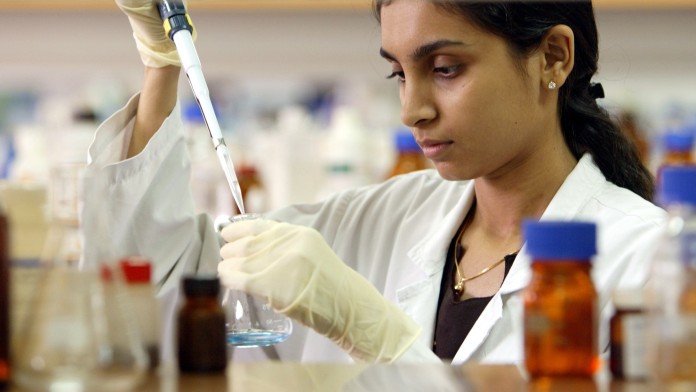As of: 04/2023
Only a small number of pharmaceutical companies develop medicines to combat illnesses that primarily occur in developing countries because there is a lack of well-funded demand. The Adjuvant Global Health Technology Fund is one of several funds promoting global health; KfW is a key participant, acting on behalf of the German Federal Government. It supports the development of medicines, vaccines and diagnostic products for poverty-related diseases to the point of market launch. KfW has invested EUR 20 million in the Adjuvant Fund. A total of USD 300 million was raised for this fund alone. The fund closes a gap in the market between purely publicly and purely privately financed development of healthcare innovations.

The coronavirus pandemic has shown how closely the health of people all around the world is interlinked. However, in many countries COVID-19 is just one pathogen among many. Malaria and tuberculosis, diarrhoeal diseases like cholera, and even malnutrition claim many lives in developing countries and emerging economies. Research into medicines and vaccines against diseases that primarily affect poorer people has not received enough funding up to now.
Non-profit organisations known as product development partnerships were established back in the 1990s to improve the availability of suitable medicines and vaccines, diagnostic tools and medical devices for the typical diseases of developing countries and emerging economies. In contrast, almost entirely privately funded research focuses on medicines that are only intended for affluent markets.
Between these two “extremes”, however, sit numerous healthcare issues and types of disease that are of interest to both developing countries and emerging economies and, to some extent, to affluent markets. This is referred to as dual market potential. The sector is catered for by start-ups and small and medium-sized enterprises and organisations, but they often lack financing for product development to the point of market launch. This is where the Adjuvant Global Health Technology Fund (Adjuvant GHTF) comes in.
Adjuvant GHTF follows in the footsteps of the Global Health Investment Fund (GHIF), which was established in 2012 as one of the first social impact funds specialising in global health research. KfW, acting on behalf of the German Federal Ministry for Economic Cooperation and Development (BMZ), was among its main investors. Like its predecessor GHIF, Adjuvant GHTF concentrates on three objectives:
As well as key investors who were already participating in the GHIF, such as the Bill & Melinda Gates Foundation, World Bank subsidiary IFC, the British organisation Children Investment Fund Foundation and the German Federal Ministry for Economic Cooperation and Development (BMZ) through KfW, Adjuvant GHTF also includes financiers from the private sector such as Novartis and Merck. Adjuvant GHTF was thus able to mobilise three euros from private investors for every euro from the public sector.
The fund has committed to 18 investments so far. These include development of a herpes vaccine and a coating for pills that protects their active ingredients against high temperatures. This means that they can be used in regions where cold chains have limited efficacy. During the peak of the coronavirus pandemic, the development of COVID-19 test kits was also financed. These kits received immediate approval and were used locally right away, for example in Africa.
In Bangladesh, the fund is financing the optimisation of food supplements that can give undernourished children and pregnant women important vitamins and minerals. The fund is also promoting a company that is backing mobile and decentralised vaccine production.
The products that are developed with the fund’s assistance can then be obtained through local hospitals and state health programmes, as well as via procurement mechanisms promoted by the German Federal Ministry for Economic Cooperation and Development (BMZ) and made available to developing countries.
Health products focusing on neglected and poverty-related diseases and on maternal and child health are high-impact in order to improve health in developing countries and emerging economies. Adjuvant GHTF is one of several international health funds in which KfW participates on behalf of the German Federal Government. In particular, these funds cover the otherwise difficult-to-finance process, ranging from product development and clinical trials in which efficacy is tested to marketable drugs and their introduction in developing and emerging economies.
Adjuvant GHTF has been able to raise USD 300 million, meaning that it is already three times the size of its predecessor GHIF. Adjuvant GHTF will run until at least 2029 and has already contributed to the development of eight vaccines, six therapeutics and two diagnostic tools as well as new medical equipment. The first products have already been approved. The total effect so far amounts to 600,000 years of life, which without these products, would otherwise have been lost to illness or death.
Structured funds like Adjuvant GHTF offer a model for using public funds to achieve a gearing effect, mobilising private funding and thus reducing the burden on the public purse. They are an important component in the architecture of global healthcare financing.
The project contributes to the achievement of these following United Nations Sustainable Development Goals:
KfW Group
KfW Development Bank
+49 69 7431-3469
Share page
To share the content of this page with your network, click on one of the icons below.
Note on data protection: When you share content, your personal data is transferred to the selected network.
Data protection
Alternatively, you can also copy the short link: kfw-entwicklungsbank.de/s/enzBro-7
Copy link Link copied